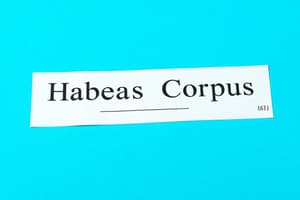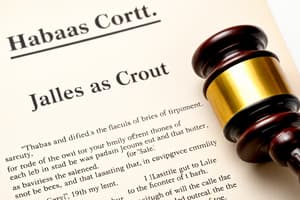Podcast
Questions and Answers
Habeas corpus refers to:
Habeas corpus refers to:
- A court order demanding that an individual in custody be brought into court and shown the cause for detention (correct)
- Any law that declares an action to be illegal after it has been committed
- A law that declares guilty of a crime without a trial
- The right of government to take private property for public use
Conflicts over whether public schools should be allowed to assign readings from the Bible and lead nondenominational prayers are examples of disagreements over the:
Conflicts over whether public schools should be allowed to assign readings from the Bible and lead nondenominational prayers are examples of disagreements over the:
- Meaning of selective incorporation
- Meaning of the establishment clause (correct)
- Applicability of prior restraint
- Meaning of eminent domain
Freedom of speech and of the press have a special place in the American system because:
Freedom of speech and of the press have a special place in the American system because:
- Free and open debate is an essential mechanism for determining the quality and validity of competing ideas (correct)
- They have never been restricted in the history of the United States
- They were the only liberties explicitly mentioned in Article 1 of the Constitution
- They were the last provisions in the Bill of Rights to be incorporated through the due process clause of the Fourteenth Amendment
The first test for determining when the government may intervene to suppress political speech was called the ___ test.
The first test for determining when the government may intervene to suppress political speech was called the ___ test.
What was the Supreme Court case that declared the exclusionary rule?
What was the Supreme Court case that declared the exclusionary rule?
The ruling in Plessy v. Ferguson (1896):
The ruling in Plessy v. Ferguson (1896):
Flashcards are hidden until you start studying
Study Notes
Habeas Corpus
- Habeas corpus is a court order requiring that an individual in custody be brought before the court.
- It ensures that a detainee can contest the legality of their detention.
Bill of Rights Supporters
- The strongest advocates for adding a Bill of Rights to the Constitution were the anti-federalists.
- They believed it was essential to protect individual liberties against potential government overreach.
Nationalization of the Bill of Rights
- The Fourteenth Amendment serves as the constitutional basis for the nationalization of the Bill of Rights.
- It incorporates specific rights at the state level through due process protections.
Impact of the Fourteenth Amendment
- The Fourteenth Amendment enforced nearly all provisions of the Bill of Rights onto state governments, although full application took over a century.
- It significantly transformed the relationship between state and federal law regarding individual rights.
Separation of Church and State
- The establishment clause of the Constitution embodies the principle of a wall of separation between church and state.
- This clause prohibits the government from establishing a religion or showing preference for one over another.
Public School Religious Practices
- Conflicts concerning Bible readings and nondenominational prayers in public schools illustrate disagreements over the establishment clause.
- These debates center around the principle of maintaining a secular educational environment.
Importance of Freedom of Speech and Press
- Freedom of speech and press is fundamental in America as it promotes free and open debate, essential for evaluating the validity of differing ideas.
- These rights were prioritized in discussions about the Bill of Rights and their incorporation into the Constitution.
Clear and Present Danger Test
- The "clear and present danger" test is the initial standard for determining when the government may suppress political speech.
- This test assesses whether speech poses an immediate threat to public safety or national security.
Exclusionary Rule
- The principle of the exclusionary rule was established in Mapp v. Ohio, preventing illegally obtained evidence from being used in court.
- This ruling reinforces the Fourth Amendment's protection against unreasonable searches and seizures.
Ruling in Plessy v. Ferguson
- In 1896, Plessy v. Ferguson established the "separate but equal" doctrine, legitimizing racial segregation.
- The ruling indicated that segregation by race was permissible under the law, shaping civil rights discussions for decades to come.
Studying That Suits You
Use AI to generate personalized quizzes and flashcards to suit your learning preferences.




